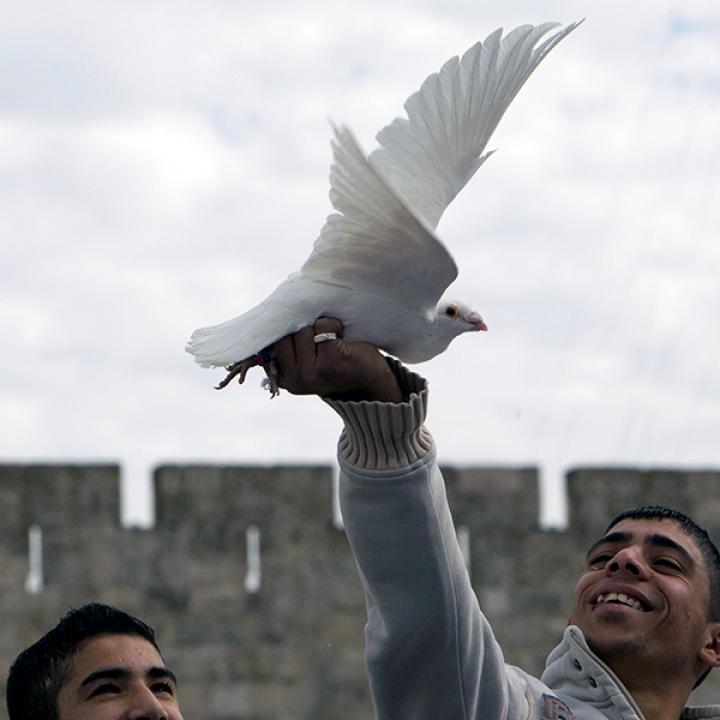

Moderation would erode the occupation's raison d'etre by helping Palestinians and Israelis see their overlapping goals, and a good starting point would be mutual recognition.
When I used to give lectures about the concept of wasatia, the Arabic word for moderation, Palestinian audiences would persistently ask two questions: Why should Islam be moderate to please the West and the United States? And how would moderation end the occupation? These are two important questions that must be accurately and convincingly answered.
In response to the first question, I would cite verses from the Quran that urge believers to be moderate in all aspects of life and note that the Prophet Muhammad's sunna -- his actions and sayings -- exemplified moderation, tolerance, and forgiveness. The second question is more challenging. Palestinians are living in the midst of a protracted conflict and suffer on a daily basis from a harsh military occupation, despairing political instability, poor governance, social unrest, and worsening economic conditions. This is compounded by daily headlines of Israeli land expropriation, indiscriminate imprisonment, restrictions on movement, and human rights violations. How can I answer this question without sounding unrealistic or too idealistic?
Radicalism and religious extremism have been on the rise in the last decade. They intoxicate Palestinians, offering them an escape from their wretched reality. For many, logic and objectivity simply do not resonate anymore. As one Palestinian imam in Ramallah told me, "When in my Friday sermon I talk about ethics and religious values, I find later that the worshipers have slipped away to another mosque where the imam delivers a passionate political speech in his Friday sermon in which he attacks Israel and its U.S. ally, describing Christians and Jews as infidels whom Muslims should not even greet or welcome in their homes. What should I do? Preach to myself? Preach to an empty mosque?"
In order to broaden the appeal of the Wasatia movement, it is important to talk to the public in a language they revere and respect: the language of the Quran. We can break down barriers and engage even the most recalcitrant critics with the Quran's peaceful and humane message.
Moderation is not an exclusively Islamic concept. So the goal of the Wasatia movement is twofold: to unite the Muslim community and to build bridges of reconciliation with other religious groups. Moderation will allow for reconciliation in the midst of conflict, which would lead to a life of cooperation, prosperity, and eventually conflict resolution.
The word wasatia comes from the Arabic root wasat. Linguistically, the word means "center," but religiously, it denotes justice, tolerance, temperance, and centrism. The term is mentioned in the Quran more than once, such as in Surat al-Baqarah, verse 143, which reads: "And thus We have made you ummatan wasatan [a moderate nation]." Its core tenets -- liberty, equality, and fraternity -- are foundational religious values that carry significant social and political implications. Some of the social values that emerge from these fundamental principles in Islam include those emphasizing taaruf (knowing one another), taawun (cooperation), and takamul (complementarity and completion).
To address the question of how moderation leads to end of occupation, my response is simple: it will help Israelis and Palestinians realize the overlap in their desires. Israelis, concerned with personal and national security, will see the neighboring Palestinian community as a moderate culture seeking a better life for family. Similarly, Palestinians will see the Israelis as seeking peace and security in order to secure a prosperous future for their society. As such, the raison d'etre for occupation fades away.
Both the Islamic and Jewish traditions fully support the concept of reconciliation; there is justification for the peace process in the texts of both faiths. Thus we need to work with, not against, each other; we must perceive the other not as an enemy in conflict, but a partner in peace. Perhaps a good starting point would be mutual recognition. Israel could recognize Palestine as a member state of the United Nations, and Palestine could acknowledge Israel within the 1967 borders as a homeland for the Jewish people. Israel could free Palestinian prisoners, and Palestinians could end incitement and their calls for anti-normalization.
We must ask ourselves, which agreement would be more durable, more sustainable, and more legitimate: one with the Palestinian Authority or the State of Palestine? Strategically, it is in the best interest of Israel and the United States to support Palestine's quest for statehood. Recognizing the State of Palestine is not recognition of Hamas or Fatah, but the right of the Palestinian people to join the international community. It would help undermine radicalism and extremism at home, because it says -- loudly and clearly -- that diplomacy works, not violence.
As a Muslim, I feel shame for what some individuals and groups are doing in the name of my religion. But I also feel very proud when I read about the tolerance and mercy of the second caliph, Umar ibn al-Khattab, who saw an old Jew begging and allocated for him a monthly salary; or Saladin, who sent his physician to treat his sick enemy Richard the Lionheart; or the illuminating history of Andalusia, where Islam, Christianity, and Judaism coexisted in peace and harmony. That is what the Wasatia initiative is all about. We aspire to leave a legacy of peace, forbearance, coexistence, reconciliation, compassion, empathy, and respect. This is the inheritance we would like to leave to our children. It may now seem like a dream, but deep in my heart I feel one day it will become a reality.
The voices of wisdom and moderation should grow louder. The moderate majority should not remain bystanders when mayhem looms. We need to overcome our obsession with failure and invest in the future. Reconciliation is the starting point and it should commence today for peace to prevail.



